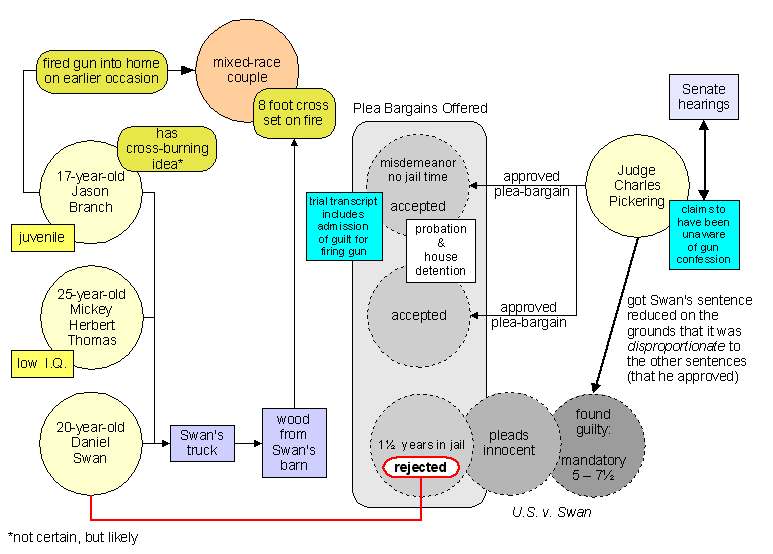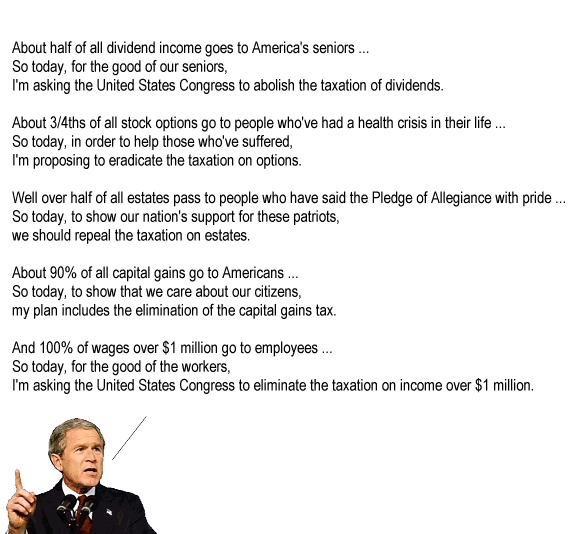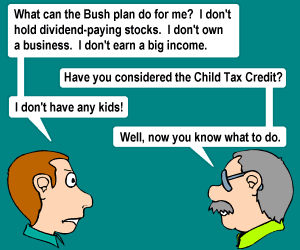Saturday, January 11, 2003
Show me a picture! This diagram shows key elements in the Pickering / Swan affair. Inspired by Roger Ailes excellent coverage of this matter.  What it's all about What it's all about: Conservatives assert that Pickering reduced Swan's sentence because it was disproportionate to the punishment for the other two - plain and simple. As if he was a judge, new to the scene, making an impartial review. They also point out that the Clinton Justice Department's Office of Civil Rights was involved in the case, and bears some responsibility for the various deals/sentences. Opponents of Pickering note that he was involved with the other two deals, approved them, and it's inconsistent for Pickering to attack Swan's sentence for being disproportionate. Also, in Senate hearings Pickering testified that (at some point in the process) he had no knowledge of a specific issue - the juvenile's use of a gun. But from the beginning, that fact was firmly established and recorded in the trial transcript. One thing that hasn't gotten much play is that of the three culprits, Swan was the most mature (the others being a juvenile or low-IQ), was instrumental in carrying out the cross-burning (they used his truck and materials), and therefore deserved a tougher plea-bargain offering. When conservatives tell the tale, the juvenile is the ring-leader and Swan a mere tag-along - unworthy of harsh punishment.
ReferencesPro-Pickering: Byron York (National Review), WSJ Editorial, Byron York again Anti-Pickering: Michael Crowley (TNR) Other: Washington Post Media Notes (Kurtz), Yahoo page on the issue, Frist on Meet The Press
posted by Quiddity at 1/11/2003 03:11:00 PM
0 comments
Then and now: Then (October 28): Remarks by the President at New Mexico Welcome"John Sanchez is the right man for governor." (Applause.) "When you turn out the vote, make sure you back this good man. He's going to make you one you can be proud of." (Applause.) (November 6):New Mexico Positive Testing Ground for Former ClintoniteRichardson defeated freshman Republican state Rep. John Sanchez 58 to 36, with 80 percent of precincts reporting.
Republican Gov. Gary E. Johnson was forced to step down after being term-limited, so the GOP chose Sanchez, a businessman still in his first term in the House. Now (Jan 9): Press Briefing by Ari FleischerQ What message does the administration want New Mexico Governor Bill Richardson to convey to the North Koreans?
MR. FLEISCHER: I'm not sure that's quite the issue. In this instance, Governor Richardson, who was the former Ambassador to the United Nations, received communication from the North Koreans in New York -- the North Korean Ambassador -- saying that he wanted to visit with Governor Richardson. Governor Richardson called the State Department. Under all our agreements with North Korea, in order for the U.N. Ambassador to the United Nations from North Korea to travel outside of New York, the State Department has to grant permission, per the agreements. So Governor Richardson, knowing that as a former Ambassador, contacted Secretary Powell. Secretary Powell said that he had no objections to North Korea traveling to New Mexico to visit with Governor Richardson.
Q But sources close to Richardson have said that the administration initiated some contact with him about a discussion with North Korea.
MR. FLEISCHER: The conversation as it was related to me was exactly as I laid out. (Jan 11): Richardson Hosts 3rd Day of Talks with North KoreansTalks between a former U.S. envoy and two North Korean diplomats have been extended into a third day, with U.S. officials saying discusssions so far have made little progress on easing tensions over Pyongyang's nuclear ambitions.
Former U.S. ambassador to the United Nations, Bill Richardson, is hosting the talks at his residence in Santa Fe, the capital of the southwestern state of New Mexico, where he now is governor.
posted by Quiddity at 1/11/2003 07:18:00 AM
0 comments
Wednesday, January 08, 2003
Missed opportunity: Sometime in the 80's, the ability to offset income with capital losses was set at $3000/year (for non IRA/401k accounts). That hasn't been inflation adjusted for over 15 years, and now makes it virtually impossible to fully use, say, a $60,000 stock loss. You'd have to apply $3k for twenty years, which is a very long time. Why not increase the amount from $3,000 to $10,000? (or more) It has a number of virtues: - It really helps those in the middle income ranges ($30k - $100k).
- It helps out those who have been unlucky in the stock market. Why reward those who do well? Why not show some compassion for those who "did the right thing" (i.e. participate in the market), but got burned?
- It provides a sort of compensation for those victimized by the unethical actions that took place on Wall Street. Unfortunately, getting recompense for slippery analysis and other offenses is virtually impossible. The process is expensive, takes forever, and there's no money to pay out anyway.
- It would provide some reassurance to investors that there will be some help when markets turn bad - which would definitely make the public less wary than they are today.
Alas, the Bush administration's sole focus is on winners. Losers, even those that imbibed the free-market elixir, are of no account.
posted by Quiddity at 1/08/2003 11:44:00 PM
0 comments
 He actually said the first part about half the benefits going to seniors, but failed to note that they are rich seniors, nor did he say what portion of seniors were getting taxable dividend income.
posted by Quiddity at 1/08/2003 10:19:00 PM
0 comments
Hello Flat Tax!Bush wants to: - Eliminate the marriage "penalty".
- End double taxation.
- Abolish the estate tax.
- Eliminate taxes on dividends.
- Cut taxes the most for people who pay the most.
What do all these notions have in common? Each is another step away from taxing according to ability. Take, for instance, the marriage "penalty." The tax code assumes that if people are married, they share certain expenses and thus are more able to pay taxes than two people living separately. Of course, this is a generalization, but that happens all the time (some children are much more expensive to raise than others, but everyone gets the same credit). Bush is oblivious to the idea that for those better off, it's less of a burden to pay higher taxes than someone less fortunate. So abolish the estate tax - no matter how big that estate is. Eliminate taxes on dividends - even though most are destined for the wealthy. "Ability to pay" has no meaning to Bush. Which is another way of saying to Americans: Hello Flat Tax! It's remarkable how the discussion about taxes has been dominated by these "non-ability" arguments. By positing the notion of equality in the tax code (equal standard deduction for married vs two individuals, equal treatment of corporate debt vs dividends, cut taxes proportional to how much is paid) the debate is immediately moved away from how easy (or hard) it is for people to pay X dollars on Y income. And once you do that, everybody looks the same, and so everybody deserves to be taxed the same. Right?
posted by Quiddity at 1/08/2003 08:21:00 AM
0 comments
Tuesday, January 07, 2003
Did you know this? From the Los Angeles Times on the Bush plan: ... the state aid, if included in the final plan, [is] only [a] one-year program, in contrast to the elimination of the dividend tax, which would be permanent, and the income tax rate cuts, which would remain in effect until 2010. As a result, their price tags are considerably smaller than those for the tax cuts.
In addition, the aid package, which would funnel $6 billion to financially troubled state governments, is largely designed to solve a problem that Bush's elimination of the dividend tax is expected to create for states -- a reduction in their already diminished tax revenue.
The problem occurs because in eliminating the dividend tax -- rather than just reducing it -- the administration would wipe out the need for companies to tell Washington what they pay in dividends and the need for the Internal Revenue Service to collect the information.
As a result, states, which also tax dividends based on the federal information, would no longer be able to impose that tax. The inability would cost them from $4 billion to $5 billion in lost revenue a year, according to the independent Center for Budget and Policy Priorities. Yup, let's hear it for Bush's tax-evasion program. Seriously - what we are witnessing is a move to eliminate taxes completely. Sounds radical, but that's what's going on. Sure, there may be some base level - say on the scale of Brazil - where absolutely essential programs are paid for, but other than that, it's cash-and-carry time. Privatize everything! Privatize roads, utilities, the electromagnetic spectrum, elder health care, postal service, weather bureau, retirement insurance --- then deregulate --- and watch the "magic of the unregulated marketplace" create huge entities that dominate and overcharge the public. Almost sounds like science-fiction, doesn't it?
posted by Quiddity at 1/07/2003 09:10:00 PM
0 comments
Wow! We read this in the Washington Post about Bush's economic proposal: Of the $674 billion package, all but $3.6 billion comes in the form of tax breaks ... The de-funding of the federal government is moving apace. News reports headline that "the bulk of the program goes to reducing taxes." Bulk of the program? How about all of the program?
posted by Quiddity at 1/07/2003 01:51:00 PM
0 comments
Monday, January 06, 2003
In order to help you, the Bush administration discourages condom use. It's a matter of money, not morality. posted by Quiddity at 1/06/2003 08:02:00 PM
posted by Quiddity at 1/06/2003 08:02:00 PM
0 comments
Prez speaks out about his economic plan: From the White House website: "This is a plan that provides tax relief to the working citizens. It's a plan that is a very fair plan." So why is it that half the cost of the plan will come from eliminating taxes on dividends - an income stream you get without working?
posted by Quiddity at 1/06/2003 06:30:00 PM
0 comments
Sunday, January 05, 2003
Favor the rich over the general welfare: We have yet to get the final word on Bush's tax plan, but it looks as if he's proposing that individuals pay no taxes on dividends. We don't like the idea, but for the sake of argument, let's say that we want to reduce taxes on dividends. The proper thing to do is equalize it with debt: make dividends fully deductible by the corporation. That means: - Money goes to work immediately, either in hiring more people, or reducing prices for the consumer.
- The progressivity of the tax system is retained. Wealthy people will continue to pay more taxes on their dividends than others.
- There is no distortion of corporate finances which the current preferential treatment of debt promotes.
Instead, Bush is proposing a less optimal scheme: One that benefits the wealthy, and is less capable of helping the economy.
posted by Quiddity at 1/05/2003 09:09:00 PM
0 comments
On television: This week we watched The McLaughlin Group's 2002 Year-End Awards. Categories included: Boldest Political Tactic, Most Overreported Story, Best Idea, and for The Most Honest Person of the Year there was this:Michael Barone: "Well, I'll nominate somebody from the blogerdom - the weblogger - Andrew Sullivan of andrewsullivan.com. A conservative on most issues, who started right from the start against Trent Lott after he made that comment on December 5th. He and Josh Marshall of talkingpoint[s]memo.com, who is a liberal, were both relentless in going after Lott and they picked up the story before anybody in the conventional press did. Most honest! Congratulations Andy!
posted by Quiddity at 1/05/2003 04:42:00 AM
0 comments
|